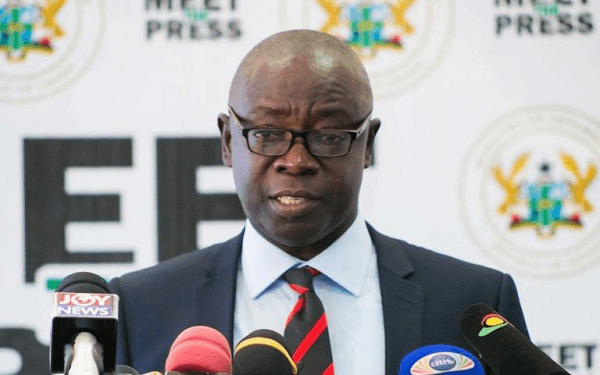
Ban on rosewood extended indefinitely as Committee recommends forensic audit
The Minister of Lands and Natural Resources, Mr Kwaku Asomah-Cheremeh, has extended indefinitely the ban on the harvesting, transportation, processing and exportation of rosewood.
The extension to the ban which was first imposed in March is a measure to completely halt the illegal trade in the endangered tree species.
Advertisement
The move is in accordance with the recommendations made by a committee that was set up to investigate allegations made by the Environmental Intelligence Agency (EIA) that government officials were involved in institutionalised corruption in the illegal trade in the endangered tree species.
At a news conference held in Accra last Friday to announce the ban on rosewood, the minister called for inter-agency collaboration, especially between metropolitan, municipal and district assembles (MMDAs), the Forestry Commission, the Customs Division of the Ghana Revenue Authority (GRA) and the security agencies to clamp down on all forms of illegal trade in Rosewood.
He also asked the Forestry Directorate of the Ministry of Lands and Natural Resources to work with the Forestry Commission to develop watertight surveillance systems or tracking mechanisms in the rosewood hotspot districts to eradicate the illegal trade in the resource.
Investigations
The EIA published an investigative report in July, 2019, alleging massive corruption by top government officials in the export of rosewood to China.
It alleged that its investigations revealed that some officials egaged in the illegal trade in rosewood were selling the permit on the Convention on International Trade in Endangered Species (CITES).
The agency also alleged that some six million trees of rosewood had been lost to the illegal trade.
The government, therefore, set up a seven-member committee to investigate allegations made against the public officials and make recommendations to halt the illegal trade in the endangered tree species.
The committee was set up in August, 2019, under the chairmanship of the Deputy Minister of Lands and Natural Resources in charge of Forestry, Mr Benito Owusu-Bio, and tasked to investigate alleged corruption in the rosewood trade in the country despite the ban on the resource.
Members of the committee were from the Parliamentary Select Committee on Forestry; Customs Division of the Ghana Revenue Authority (GRA); Civil Society Organisations (CSOs); Forestry Commission; the Ministry of Foreign Affairs and Regional Integration and representatives from the security agencies.
The committee completed its work and submitted the report to Mr Asomah-Cheremeh on December 23, last year.
Findings
At last Friday's news conference, Mr Asomah-Cheremeh said the committee's report had not established any acts of corruption against any government official in the rosewood trade.
"The video footages and other materials provided by the EIA did not have enough evidence to back its corruption claims.
“Again, the actual rosewood exported between 2012 and 2019 was 489,766 trees and not six million trees as EIA alleged in its publication," he said.
Mr Asomah-Cheremeh also said the committee had uncovered that a number of permits issued for rosewood export were sent to Vietnam and the volumes approved on the permits were altered.
He added that the committee's checks with the Vietnamese Customs had revealed that some Ghanaian freight forwarding companies had produced fictitious documents at the blind side of the Customs Division of the GRA.
Mr Asomah-Cheremeh directed that in the interim, all stockpile of rosewood lying at various sawmills and hotspots across the country should be evacuated to a central location and auctioned for value-added processing.
He called for more attention to be placed on freight forwarding companies that falsified documentation covering wood export, especially the illegal export of rosewood to Vietnam.
Committee’s report
Meanwhile, a copy of the committee's report made available to the Daily Graphic revealed that "there were several institutional weaknesses and lapses in the rosewood trade right from the community level to the ports of exit, due largely to the highly informal nature of the trade."
According to the report the committee found that the institutional weaknesses had led to "widespread irregularities" along the rosewood value chain.
The committee also said it was unable to prove the allegations made by the EIA that CITES permits had been sold as part of a scheme to perpetrate the illegal trade in rosewood.
To unravel the mystery, the committee recommended that a forensic audit of the CITES Secretariat at the Forestry Commission be conducted immediately by the Bureau of National Investigations (BNI) or any other state intelligence agency to establish the veracity of the allegations made by the EIA
"We also recommend a similar audit at some selected companies that exported rosewood to Vietnam with different documentation to what was approved by the CITES Secretariat at the Forestry Commission," the report added.
The report also recommended a full inventory of all living rosewood logs and the establishment of regional centres where all confiscated rosewood could be deposited for auction.




